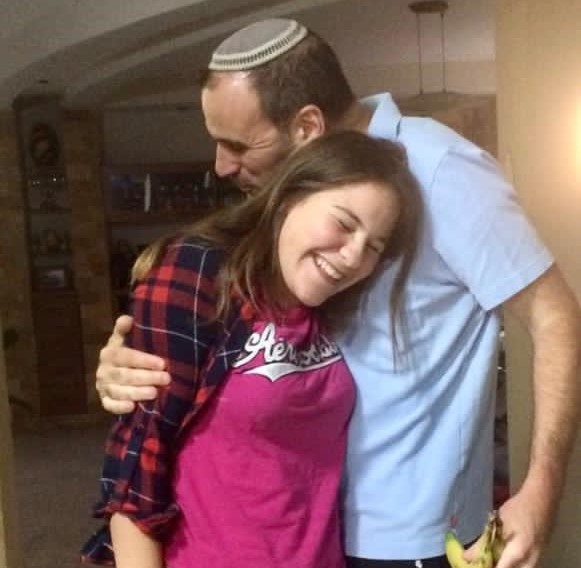
Banner

‘Speaking about suicide saves lives,’ says expert
Rabbi Shalom Hammer and his family were blindsided by the devastating loss of his beloved daughter, Gila, 18, who tragically took her own life in 2019.
Gila, had been facing serious mental health challenges after being sexually assaulted two years earlier.
She went from being a “happy-go-lucky” joyful teenager to spiralling into a deep depression while living with a terrible secret which lead to her demise.
“I was at shul with my son when I received the news,” said Rabbi Hammer, “Everything changed. It’s a day I will never forget,” he said.
Since that day, he has devoted his life to honouring Gila’s memory by raising awareness about suicide prevention. With deep compassion and determination, he strives to change the way society understands and addresses mental health, hoping to save lives one talk at a time and spare other families the grief his own has endured.
“We never believed our daughter would tragically die from suicide,” he told the SA Jewish Report.
Hammer is in South Africa this week to address the community, from school children to parents to healthcare professionals, on the importance of education about suicide. He is doing so in the face of a concerning rise in the number of suicides and attempted suicides in the community and their devastating aftermath.
His visit coincides with World Suicide Prevention Day on Tuesday, 10 September, which aims to focus attention on this growing issue, reduce stigma about suicide, and raise awareness, giving the message that suicides are preventable.
“A simple ‘Howzit’, or ‘How are you today?’ can save a life. This greeting could be throwing someone who is struggling a lifeline,” said the American Israeli lecturer and author of several books who has visited South Africa numerous times.
“It’s a myth to think that talking about suicide promotes suicide. The opposite is true. The more we talk about it, the more we can lower the suicide rate and save lives,” he said.
“When a person suffers from mental illness, we should view it like any other illness and believe that it can be curable with time and care. The vast majority of adolescents and others are able to overcome and go on to lead successful lives. They just need someone to recognise their pain. I’ve seen it.”
In the aftermath of his devastating loss and soon after sitting shiva, Hammer channelled his grief into action, using his expertise as a rabbi and educator to promote awareness. He now speaks tirelessly on the issue, and leads workshops across a wide range of settings – from schools and prisons to army bases and synagogues – emerging as a passionate advocate for change.
“I used to wake up with a tremendous amount of pain and reflection. I now wake up with motivation and reflection. Everyone grieves differently. There are no rules. The only way I know to confront death is to help to save lives,” Hammer said.
He started a non-profit organisation called Gila’s Way, which implements programmes on mental health awareness and suicide prevention in order to save lives. “It all starts with communication and dialogue,” Hammer said.
“The vast majority of people who die from suicide don’t want to die. Particularly adolescents, who are still developing and who may impulsively make a decision within a few seconds, not realising that it’s finite. When people understand that most people who die from suicide didn’t want to die, they also understand that this means we’re capable of saving that person.”
For the first 16 years of her life, Gila was happy-go-lucky, vivacious, rosy cheeked, and vibrant, he said.
“People fell in love with her. Gila was innocent and jovial. You would never have known she was someone who was suffering and who fell into a deep dark depression or would even think about taking her own life. However, for the last year and a half of her life following a devastating trauma, things spiralled out of control, ending tragically,” he said.
He urges parents to pay attention to what their child is “saying”.
“A child – or anyone for that matter – who is dealing with mental health challenges or experiencing a crisis won’t necessarily explicitly say, ‘I need help’, but they will often send ‘cries for help’ and share those signs because they really want help. Some of those warning signs can be familial/social isolation, spending long hours in their bedroom, and refusing to join the family for activities which they normally enjoyed. In addition, they may be exhibiting exhaustion, or become physically unkempt, and they might desist from performing expected activities like going to school, doing their homework, participating in events, or may resort to substance abuse.
“I consistently emphasise to people to trust their parental instincts. We know our kids best, and care about them the most,” Hammer said.
Sheila Furman, the co-coordinator of Chevrah Kadisha Bereavement Services, said death by suicide had far reaching consequences for families and the broader community, even more so following the increase in occurrence over a short period of time.
“Since January, we have sadly witnessed a rise in the number of suicides, mainly of men. Rabbi Hammer has insight and offers a message of hope to the community. Having been through this process, he could help those who have been affected by suicide deal with that pervasive sense of helplessness,” she said.
“There’s a difference between moving on and moving forward,” said Hammer. “No-one moves on. We have the capacity to move forward and to take that person with us. Gila comes with me wherever I go.”
People who have lost a child often struggle with the question of how many children they have. “My wife and I say we have six children, and one is not with us physically right now.”
- For more information on Gila’s Way see his website www.Gilasway.com










